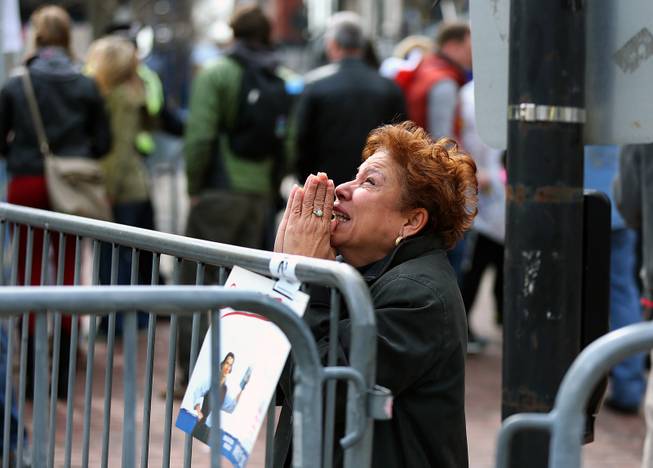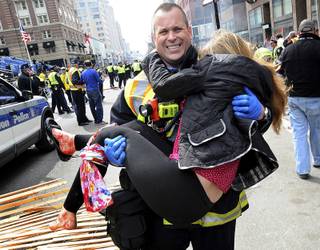
John Tlumacki / The Boston Globe
A distraught woman kneels and prays near the finish line of the Boston Marathon on Monday, April 15, 2013. Two bombs exploded seconds apart, creating a bloody and chaotic scene about four hours into the race.
Tuesday, April 16, 2013 | 12:30 a.m.
On Boston’s high holiday, as thousands gathered Monday for the 117th running of the Boston Marathon, two bomb blasts 12 seconds apart rocked the finish line, killing three people, including an 8-year-old boy, wounding about 140, and leaving the sidewalks of Copley Square covered with blood.
The explosions blew out glass, filled Boylston Street with smoke, and left scores of wounded unconscious or confused, at about 2:50 p.m., hours after the elite runners had finished the race.
Medical professionals on hand to take care of blisters and sore knees at the finish line suddenly found themselves operating a trauma center, treating life-threatening lacerations and lost limbs. Emergency workers rushed to the scene, despite the very real possibility more blasts would follow.
About 30 people were transferred to hospitals under a Code Red, meaning life threatening injuries, which may point to a rising death toll, according to a law enforcement official.
Flags were lowered to half-staff in Washington and around the nation, as the country mourned with Boston.
''We will find out who did this; we’ll find out why they did this,'' pledged President Barack Obama, in remarks from the White House hours after the blasts. ''Any responsible individuals, any responsible groups will feel the full weight of justice.''
A massive investigation was underway Monday night under the direction of the FBI, as much of the Back Bay was locked down to protect the sprawling crime scene. Officials last night called the investigation ''very active and fluid.'' Authorities were talking to at least one person at Brigham and Women’s Hospital, according to sources familiar with the questioning. Police Commissioner Edward F. Davis said no one was in custody.
''Any event with multiple explosive devices, as this appears to be, is clearly an act of terror, and will be approached as an act of terror,'' a White House official said. ''We don’t yet know who carried out this attack, and a thorough investigation will have to determine whether it was planned and carried out by a terrorist group, foreign or domestic.''
The person questioned in the hospital was a Saudi national, who was reportedly tackled and held by a bystander after he was seen running from near the scene of the explosion, said a law enforcement source who spoke with someone involved in the FBI’s investigation. The Saudi man, believed to be a university student in Boston, is cooperating with the FBI and told agents that he was not involved in the explosions, and that he ran only because he was frightened. Investigators did not characterize the man as a suspect. No one had been arrested or charged as of late Monday night.
Twitter and the Internet overflowed with rumors in the aftermath of the blast, some of which were later debunked. Law enforcement and city officials disputed published reports that investigators had discovered one or more bombs that had failed to explode.
A city touched 11 years ago by terrorism, when 9/11 hijackers took off from Logan Airport, was touched again, in a plot to inflict untold casualties at the city’s annual Marathon celebration, the one day each spring when the attention of the sporting world is on Boston.
The attack truncated the world’s most prestigious road race, which draws runners from across the globe, and will forever mar what is annually the most uplifting day of the year in Boston: Marathon Monday.
''It puts a cloud over the event for everyone,'' said runner Maureen Tighe of Boston’s North End. ''The people who finished. The people who didn’t. And the spectators. I don’t know if it will ever be the same.''
Marathon officials and police immediately ended the race after the explosions, turning runners away from Copley Square. Officials requested that people stay out of the city and asked runners and spectators to go home or back to their hotels and avoid gathering in crowds.
Police with megaphones shouted instructions to the crowds at the corner of Massachusetts and Commonwealth avenues: ''There have been some explosions. Please evacuate the area. We’re looking for secondary devices.''
Investigators faced an overwhelming crime scene, littered with bags dropped by people fleeing the blasts. Police had to treat every backpack and gym bag as a potential deadly threat. Authorities blocked cell hone service to the area to prevent any other device from being detonated by phone, leaving thousands of athletes and spectators unable to call loved ones to make sure they were OK.
Police locked down a 15-block area around the scene of the attack, in the heart of the Back Bay neighborhood. State Police sent units to every hospital in the city and to South Station to provide security and swept the State House for bombs, as a precaution.
Security steadily built throughout the afternoon at Brigham and Women’s Hospital. At the main entrance, police first restricted foot traffic. Four men dressed in SWAT gear and toting automatic rifles arrived in a sedan and took up spots in front of the revolving doors, keeping both hands on their weapons. At about 8 p.m. a large truck pulled up, carrying at least five men in SWAT gear holding automatic rifles.
Gov. Deval Patrick, who provided periodic updates through the afternoon and evening, said the blast area is expected to be closed Tuesday. He said Boston ''will not be business as usual,'' in the wake of the terror attack and that police presence will be heavy in the city. MBTA riders can expect random bag searches.
Eyewitnesses to the blasts reported a sudden shock, followed by unreal scenes of human carnage.
''I saw white smoke and at first I thought it might be a firecracker but it was really loud,'' said Megan Raftery, who was standing near the finish in front of the Mandarin hotel with her two young sons, waiting to cheer on her Marathon-running husband.
Seconds later, a second explosion directly across Boylston Street, near the Apple store, shot debris high in the air. And when Raftery looked down she saw that the explosion had blown a man’s leg off, just below the knee. ''You could see stuff just flying,'' she said. ''I looked across the street and I could see a man on the sidewalk. There was blood and part of his leg was just gone.''
Ron M. Walls, chief of emergency medicine at Brigham and Women’s, said the hospital had received 26 of the wounded. The youngest was 3 years old and was sent to Children’s Hospital; the oldest was 62.
The injuries included eardrum damage, serious limb and head injuries, but no amputations, he said. Some victims had burns, including one with very significant burns. ''I haven’t seen anything like this anywhere before,'' he said. ''These types of events are things we drill for and practice for and get ready for, but you don’t expect you’re going to see it.''
A U.S. Immigration and Customs Enforcement officer was among those who sustained less than life-threatening injuries from the explosion, said a federal law enforcement official with direct knowledge of the information. The officer was off duty and was watching the race with the rest of the spectators. He was taken to a hospital for treatment.
The Patriots Day holiday is steeped in Boston sports tradition, when the Red Sox play a rare morning game at Fenway Park, and the best runners on the planet race from Hopkinton to Copley Square, on a 26.2-mile course lined by millions of cheering, celebrating fans. As part of the prerace security stepped up since the 9/11 terrorists attacks, Boston police had swept the streets for explosives, according to State Police.
Relatives of those killed in the Sandy Hook school shooting massacre were guests at the finish line tent, near where the bombing occurred; a theme of this year’s marathon was ''26 Miles for 26 Victims,'' referring to those killed in the Newtown, Conn., shooting.
Jay O’Brien, of Cambridge, a race spectator who was about 100 yards from the explosions, said rescuers who ran toward the blast ''were clearly putting themselves in harm’s way.'' He recalled: ''There was one gentleman who looked to be in very, very bad shape, sitting in the center of Boylston Street. Within 30 seconds, there were six people around him, three police and three fire. His lower body, his pants were ripped off and a lot of blood down below. He was in a state of shock.''
O’Brien went to Brigham and Women’s Hospital after the explosions to see if he could be of any help.
Hours after the blasts, on the outer edge of the Boston Common, across from the Public Garden, Royal Courtain was with his wife, Cindy, as heavily armed police and swat officers with automatic weapons entered the Common.
Courtain was about 100 yards from the finish line when the explosions occurred. Cindy had just finished her first Boston Marathon.
''I crossed the finish line and saw the bodies. People were on the course rolling around, probably from the noise,'' he said. ''I saw injuries.'' He paused and covered his face. ''Some missing legs.'' He paused again. After the worst 30 minutes of his life, Courtain got a call from his wife saying she was unhurt.
The Boston Athletic Association called Monday ''a sad day for the city of Boston, for the running community, and for all those who were here to enjoy the 117th running of the Boston Marathon,'' in a statement. ''What was intended to be a day of joy and celebration quickly became a day in which running a marathon was of little importance.''


Join the Discussion:
Check this out for a full explanation of our conversion to the LiveFyre commenting system and instructions on how to sign up for an account.
Full comments policy